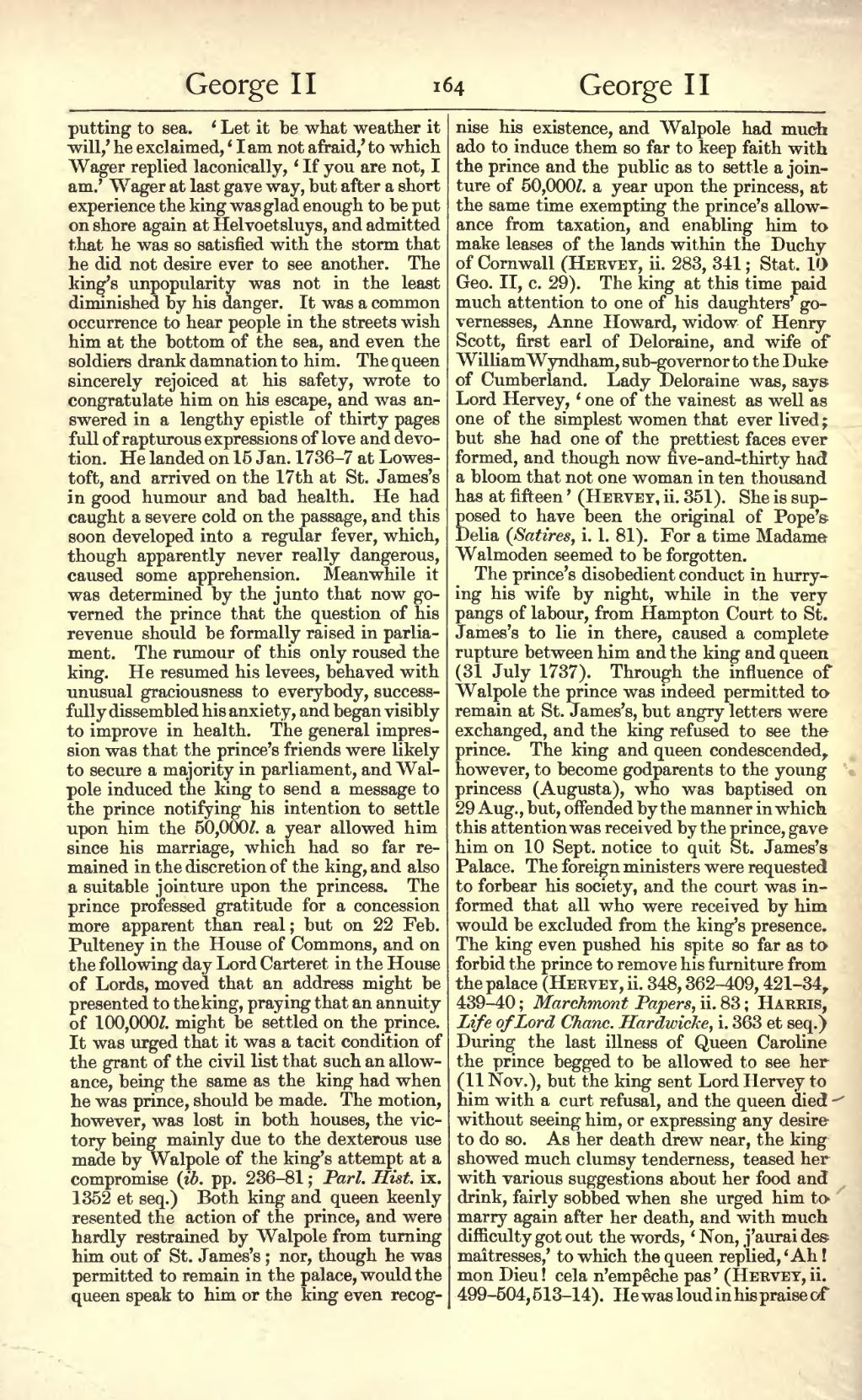putting to sea. 'Let it be what weather it will,' he exclaimed, 'I am not afraid,' to which Wager replied laconically, 'If you are not, I am.' Wager at last gave way, but after a short experience the king was glad enough to be put on shore again at Helvoetsluys, and admitted that he was so satisfied with the storm that he did not desire ever to see another. The king's unpopularity was not in the least diminished by his danger. It was a common occurrence to hear people in the streets wish him at the bottom of the sea, and even the soldiers drank damnation to him. The queen sincerely rejoiced at his safety, wrote to congratulate him on his escape, and was answered in a lengthy epistle of thirty pages full of rapturous expressions of love and devotion. He landed on 15 Jan. 1736-7 at Lowestoft, and arrived on the 17th at St. James's in good humour and bad health. He had caught a severe cold on the passage, and this soon developed into a regular fever, which, though apparently never really dangerous, caused some apprehension. Meanwhile it was determined by the junto that now governed the prince that the question of his revenue should be formally raised in parliament. The rumour of this only roused the king. He resumed his levees, behaved with unusual graciousness to everybody, successfully dissembled his anxiety, and began visibly to improve in health. The general impression was that the prince's friends were likely to secure a majority in parliament, and Walpole induced the king to send a message to the prince notifying his intention to settle upon him the 50,000l. a year allowed him since his marriage, which had so far remained in the discretion of the king, and also a suitable jointure upon the princess. The prince professed gratitude for a concession more apparent than real; but on 22 Feb. Pulteney in the House of Commons, and on the following day Lord Carteret in the House of Lords, moved that an address might be presented to the king, praying that an annuity of 100,000l. might be settled on the prince. It was urged that it was a tacit condition of the grant of the civil list that such an allowance, being the same as the king had when he was prince, should be made. The motion, however, was lost in both houses, the victory being mainly due to the dexterous use made by Walpole of the king's attempt at a compromise (ib. pp. 236-81; Parl. Hist. ix. 1352 et seq.) Both king and queen keenly resented the action of the prince, and were hardly restrained by Walpole from turning him out of St. James's; nor, though he was permitted to remain in the palace, would the queen speak to him or the king even recognise his existence, and Walpole had much ado to induce them so far to keep faith with the prince and the public as to settle a jointure of 50,000l. a year upon the princess, at the same time exempting the prince's allowance from taxation, and enabling him to make leases of the lands within the Duchy of Cornwall (Hervey, ii. 283, 341; Stat. 10 Geo. II, c. 29). The king at this time paid much attention to one of his daughters' governesses, Anne Howard, widow of Henry Scott, first earl of Deloraine, and wife of William Wyndham, sub-governor to the Duke of Cumberland. Lady Deloraine was, says Lord Hervey, 'one of the vainest as well as one of the simplest women that ever lived; but she had one of the prettiest faces ever formed, and though now five-and-thirty had a bloom that not one woman in ten thousand has at fifteen' (Hervey, ii. 351). She is supposed to have been the original of Pope's Delia (Satires, i. 1. 81). For a time Madame Walmoden seemed to be forgotten.
The prince's disobedient conduct in hurrying his wife by night, while in the very pangs of labour, from Hampton Court to St. James's to lie in there, caused a complete rupture between him and the king and queen (31 July 1737). Through the influence of Walpole the prince was indeed permitted to remain at St. James's, but angry letters were exchanged, and the king refused to see the prince. The king and queen condescended, however, to become godparents to the young princess (Augusta), who was baptised on 29 Aug., but, offended by the manner in which this attention was received by the prince, gave him on 10 Sept. notice to quit St. James's Palace. The foreign ministers were requested to forbear his society, and the court was informed that all who were received by him would be excluded from the king's presence. The king even pushed his spite so far as to forbid the prince to remove his furniture from the palace (Hervey, ii. 348, 362-409, 421-34, 439-40; Marchmont Papers, ii. 83; Harris, Life of Lord Chanc. Hardwicke, i. 363 et seq.) During the last illness of Queen Caroline the prince begged to be allowed to see her (11 Nov.), but the king sent Lord Hervey to him with a curt refusal, and the queen died without seeing him, or expressing any desire to do so. As her death drew near, the king showed much clumsy tenderness, teased her with various suggestions about her food and drink, fairly sobbed when she urged him to marry again after her death, and with much difficulty got out the words, 'Non, j'aurai des maîtresses,' to which the queen replied, 'Ah! mon Dieu! cela n'empêche pas' (Hervey, ii. 499-504,513-14). He was loud in his praise of
